Dukkah or, sometimes spelt "duqqa", is a fantastic little Egyptian seasoning you can use in simple dishes like this roasted carrot salad or use to dip homemade sourdough or flatbreads into.
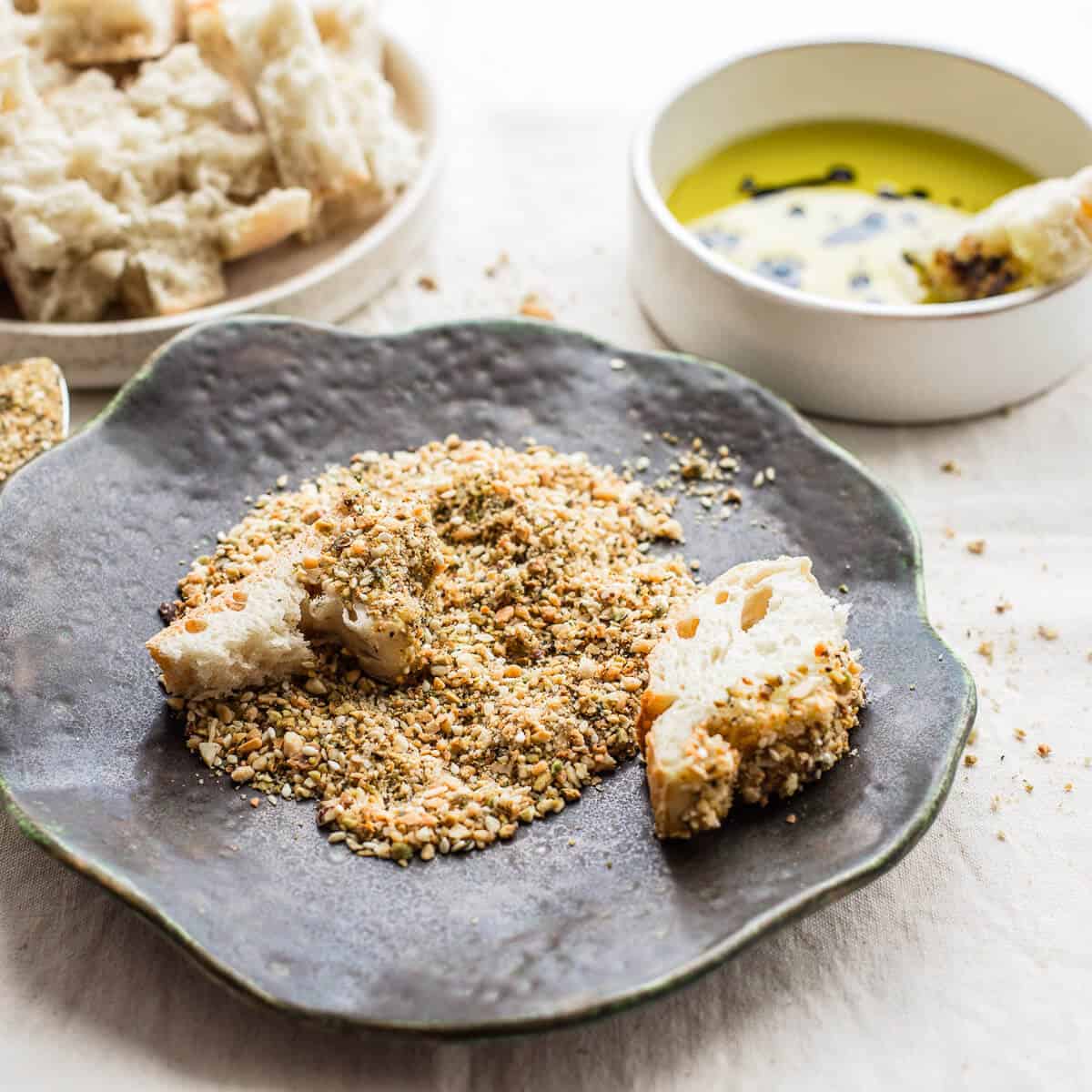
Jump to:
What is dukkah?
This Egyptian blend of nuts, spices, herbs, and seasonings can be found all over the Middle East in various Arabic and North African cuisines.
The word duqqa or dukkah means "to pound" in Arabic, as the mixture is blended, chopped or pounded into a coarse texture.
There is no single correct recipe for dukkah as each household uses the nuts, seeds and spices they have at hand. The idea is to make a crunchy, spicy, salty and sweet condiment that can be eaten in a variety of ways.
It is often used in a similar way to za'atar. Another spice condiment found in Middle Eastern cuisine. The classical way of using dukkah is to dip bread into olive oil and then into the dukkah.
It's one of the best ways to enjoy freshly baked bread, and it's extremely moorish, so you have to take caution not to stuff a whole bread down your throat in a haste of gluttony.
What does it taste like?
Dukkah has a lovely roasted nutty flavour. The taste is intensified by warming spices, and balanced with fresh thyme, salt and sugar.
Giving it a near-perfect flavour profile which makes it an extremely useful condiment.
Store-bought versions of dukkah like Trader Joe's will be much inferior to homemade dukkah so, save yourself money, and tears, and make your own from scratch.
Dukkah vs za'atar
Although both contain spices and found in middle eastern cuisine they are very different in texture and flavour.
Za'atar is mainly made with sesame seeds mixed with sumac and herbs. the texture is also finer than that of dukkah.
Dukkah is mainly made with nuts, seeds, spices, and the texture more course.
Ingredients needed
Most of the ingredients used in making dukkah will probably be lurking around your pantry. If you are missing one or two ingredients then your local supermarket will almost definitely stock it.
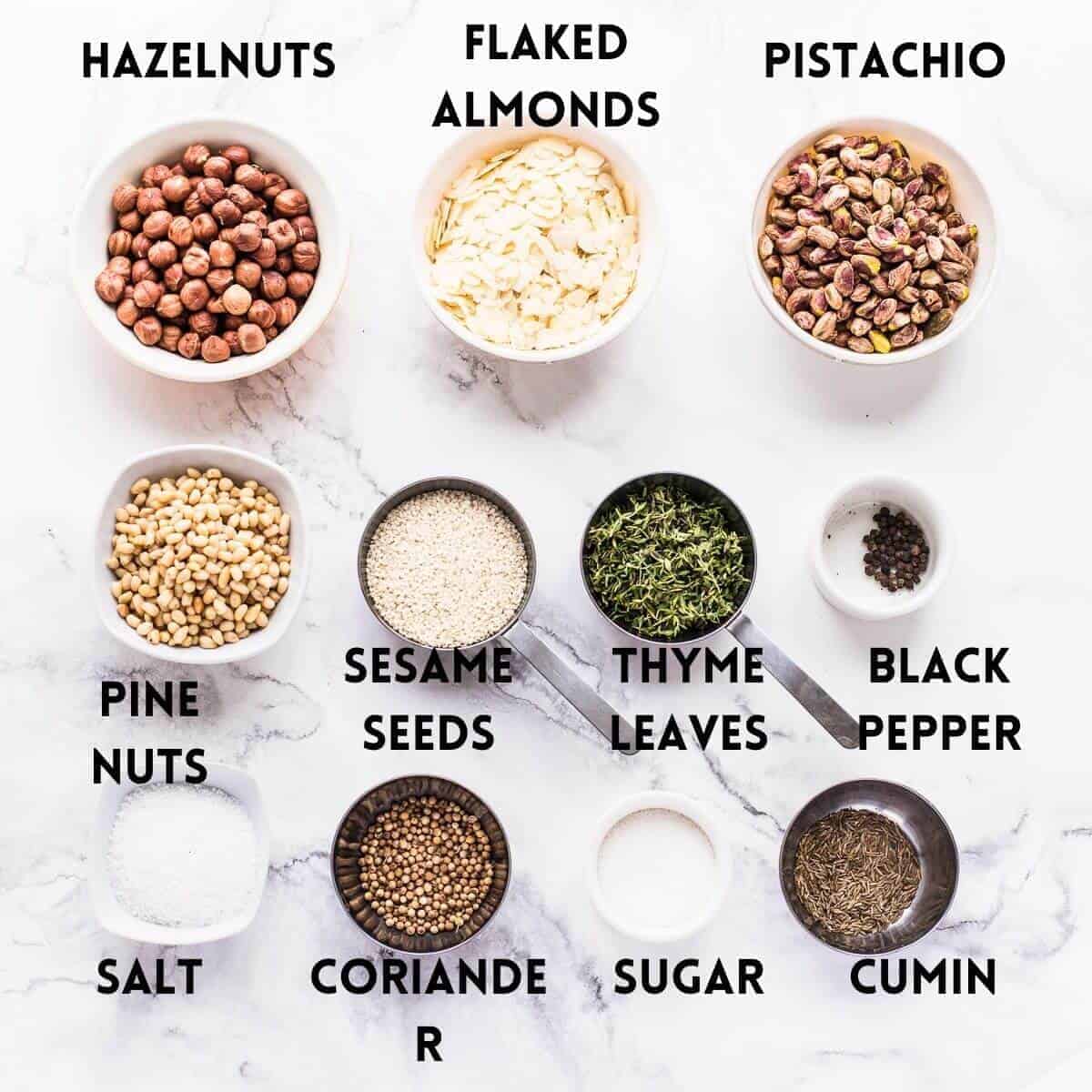
- Nuts - In this recipe, we use hazelnuts, almonds, pistachio and pine nuts. Further down we will look at alternatives and substitutions.
- Seeds - Sesame seeds. Being a Middle Eastern staple. Think Tahini. The sesame paste used in dressings marinades and most importantly hummus.
- Herbs - Freshly picked thyme leaves but others like marjoram or rosemary also work well.
- Spices - Coriander, cumin, and black pepper which we roast and grind ourselves for top results. Spices are always better when you freshly roast them rather than buy store-bought.
- Seasoning - Natural sea salt and caster sugar.
How to make it
Roasting the nuts and sesame seeds
As simple as it might seem. Roasting them properly require attention as they all take different times to roast and if you forget about them they will burn and be useless.
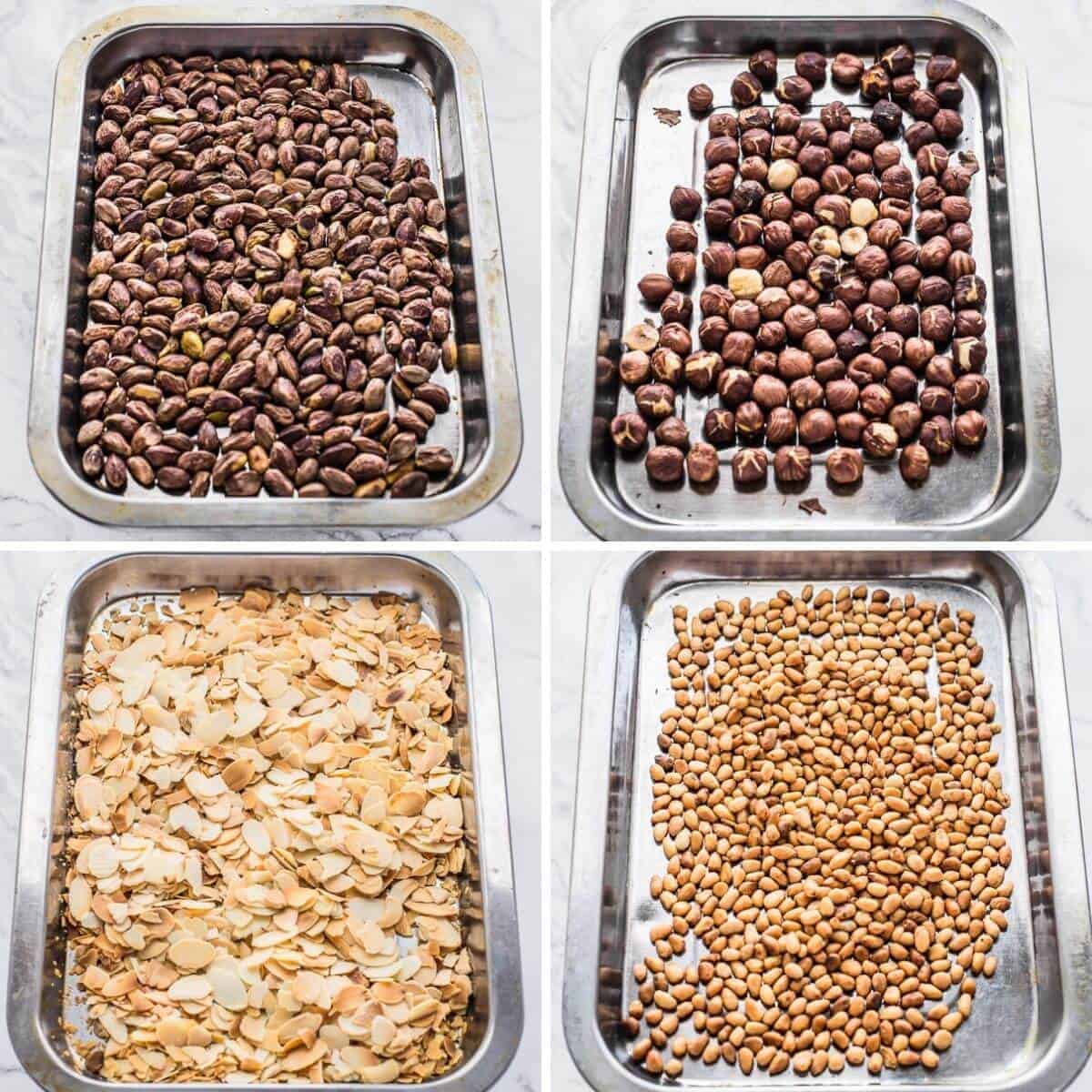
- Turn your oven to 160C or 320F.
- Spread the nuts out separately. Each onto their own baking tray or repeat if you only have one baking tray.
- For no particular reason, we shall start with the pistachios. They should already be shelled but still in their husk. Roast for about 8 - 10 minutes then remove from the oven and let cool down completely. Keep an eye on them as they roast as to not burn them. Your oven is not my oven and cooking times might differ. Common sense goes a long way. Rub them between your hands when cooled to remove most of the skin. Most people don't like the bitterness from the skins/husks so, we remove it.
- Hazelnuts next. Repeat as for the pistachios. Same time and process. Same attention.
- Flaked almonds will take slightly less time to roast. About 6 minutes should do it.
- Pine nuts are in the same boat as almonds. They burn in the blink of an eye so pay even closer attention. 6 - 8 minutes.
Make sure to cool down the nuts completely before doing anything else with them.
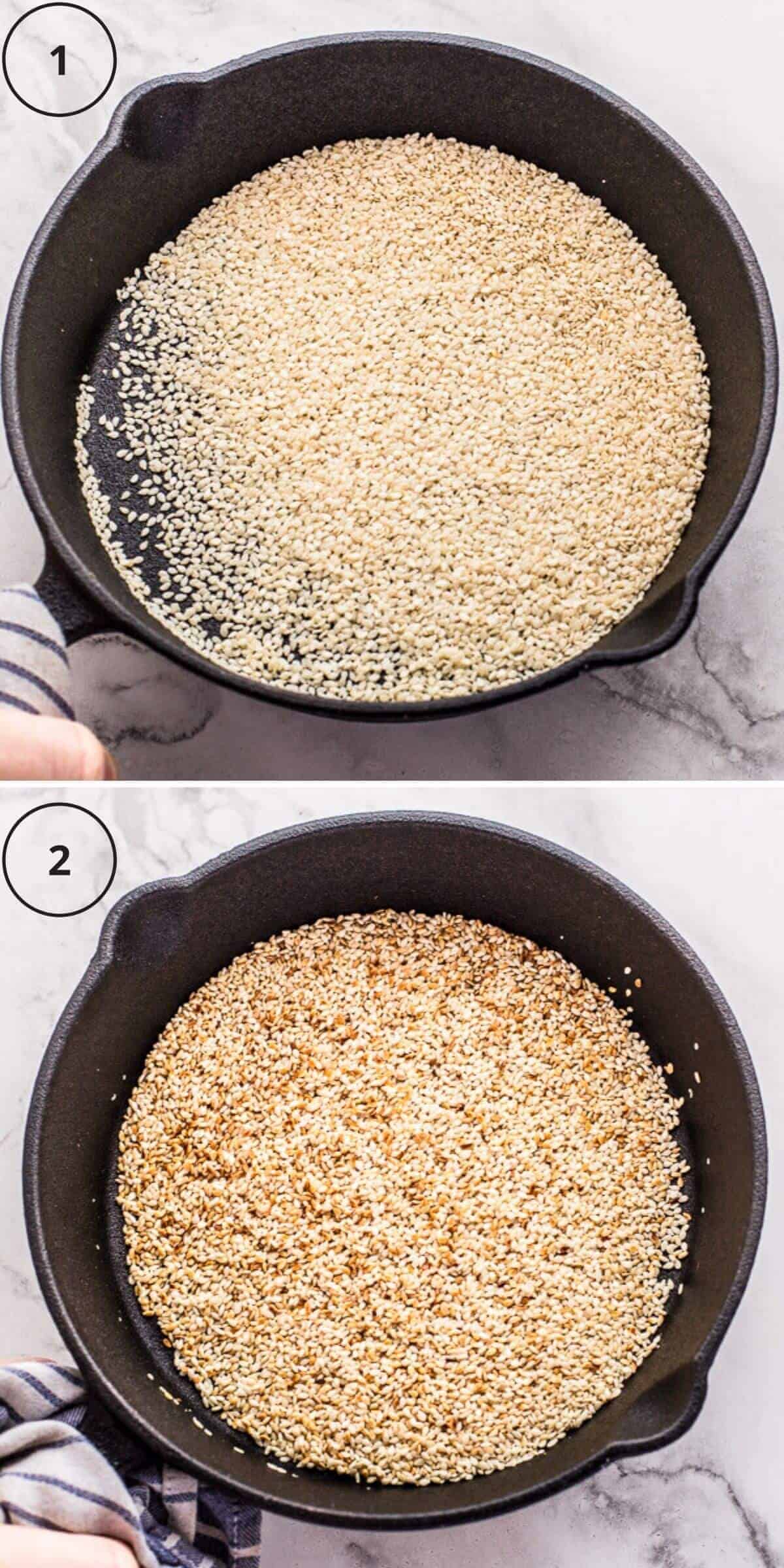
- I prefer preparing sesame seeds in a pan on the stove. Simply toast in a pan while tossing constantly over medium heat until nicely fragrant or golden brown. Once done, remove from the pan to stop them from cooking and let cool down completely.
Roasting the spices
As with roasting nuts you want to make sure they don't burn. As soon as they start giving off a nice fragrance and slightly smoking, remove from the pan.
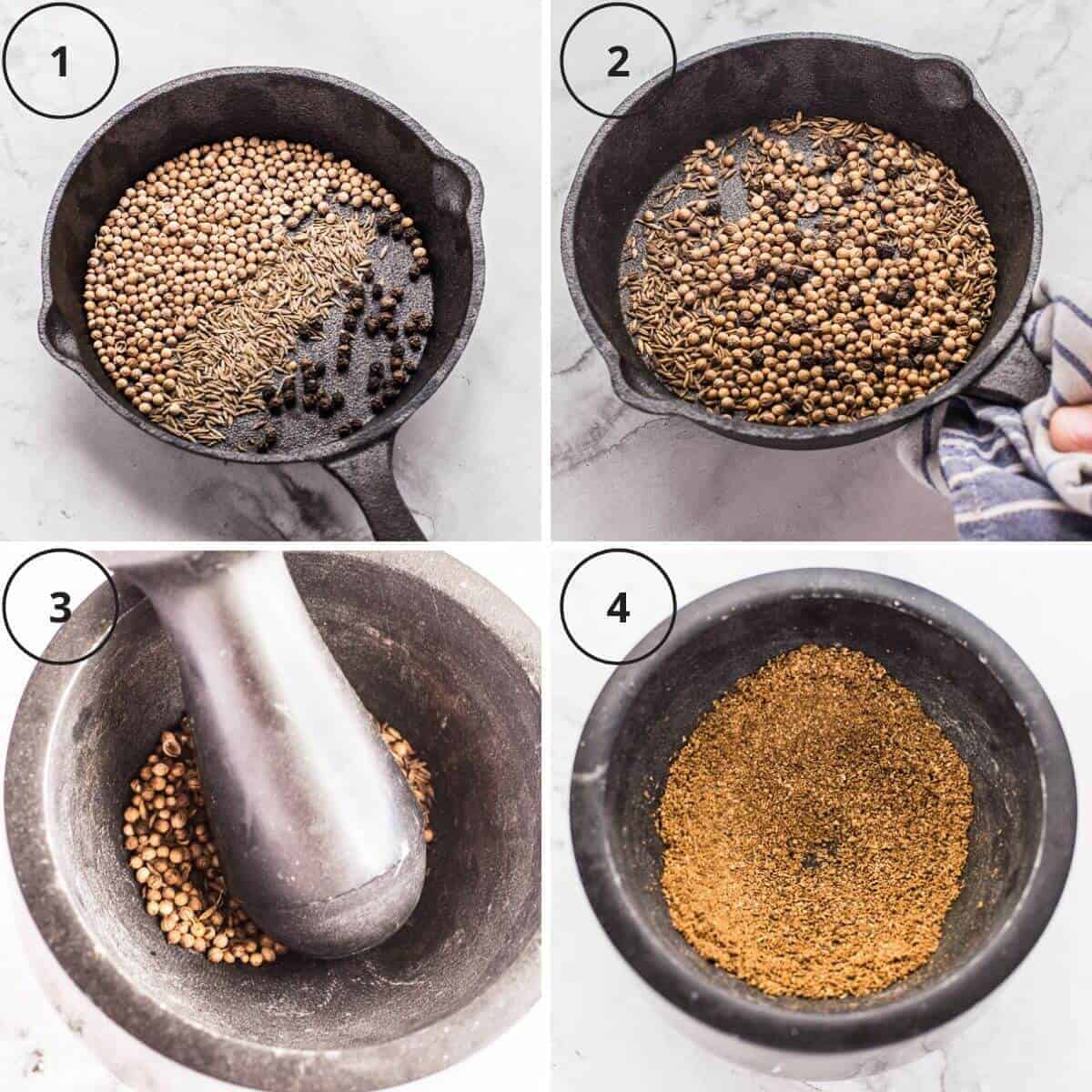
- Heat a skillet on the stove on medium heat without oil. Just dry.
- When the skillet is hot add the whole spices. Cumin, coriander, and black peppercorns.
- Toss continuously to avoid disappointment and end up with perfectly home-roasted spices.
- Add into a spice grinder or pestle and mortar. Let it cool down first before grinding into a fine powder.
Blending the mix
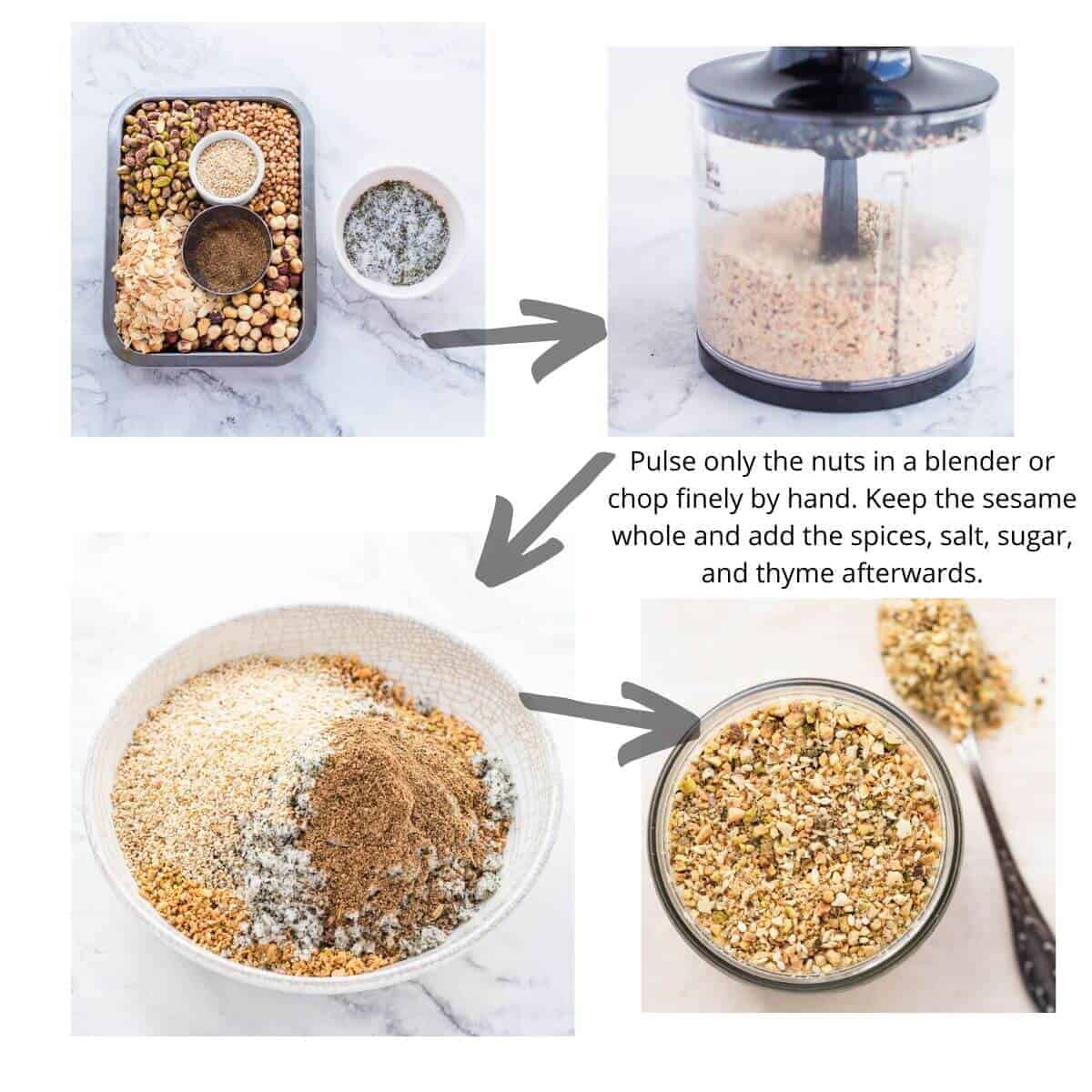
- If you have a food processor then pulse the nuts as to break them up into small bits. If you don't have a food processor then grab a knife, large chopping board and get chopping. Crush them with the side of the knife first before running the blade through it a few times until small and evenly chopped. Do not over-process. They will release their oils and you will end up with nut butter instead, so be mindful. Keeping them cool helps to avoid this which is why we cool them down before processing.
- When the nuts are blended or chopped, add them into a mixing bowl.
- Add the sesame seeds, spice mix, thyme leaves, salt, and sugar.
- Mix it up well making sure everything is evenly distributed. Now, you have proper Egyptian dukkah.
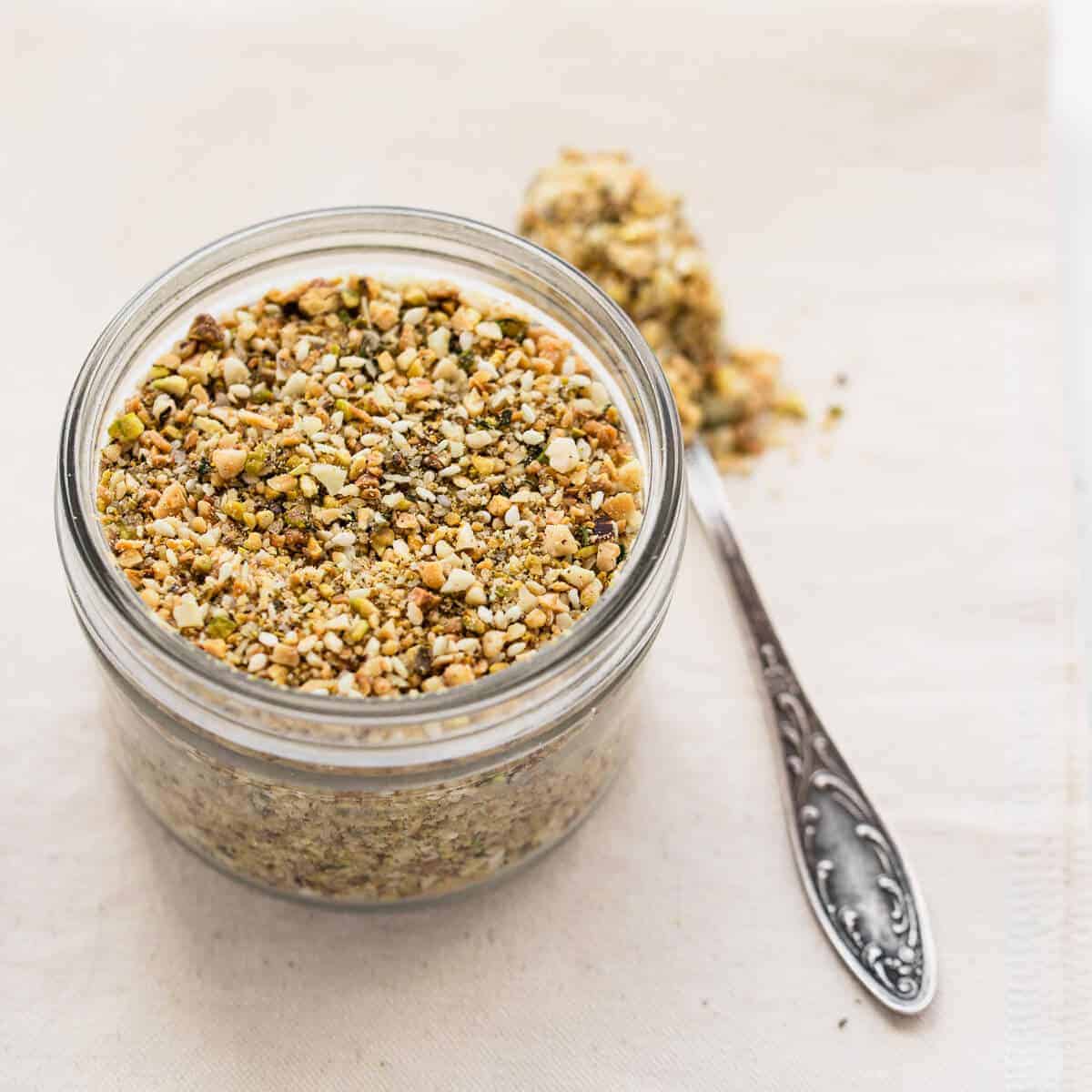
Variations
You don't have to stick to the blend I used in this recipe. You can easily change things up, and to be honest, like most Arabic and Middle Eastern recipes, each family have their own unique mix of ingredients.
Here are a few possible alternative and substitutes:
- Nuts and seeds - Walnuts, pecans, peanuts, cashews, different kinds of pistachios like Iranian pistachios that are bright green. Add black sesame seeds, sunflower seeds, or pumpkin seeds. Play around with these to make your own unique version.
- Spices - Although cumin and coriander are the most used you can create your own unique version by adding dried chilli flakes to make spicy dukkah or add some cinnamon and clove along with ground-up dried orange peel for a festive dukkah seasoning.
- Herbs - Replace the thyme with finely chopped rosemary, sage, marjoram, oregano, curry leaves or blue fenugreek among others.
- Seasoning - It doesn't have to stop at salt and sugar. You can use ground-up dried citrus peel or dried ground berries like sumac or dried rose petals to give it an extra dimension or sourness.
Serving suggestions
Dukkah is welcome on most dishes and even bitter chocolate desserts go amazingly well with a sprinkling.
Add to the following.
- Lamb - Loves dukkah and dukkah loves it. Sprinkle on to a light salad along with Persian lamb koftas, slow-roasted leg of lamb or with grilled chops as part of a Middle-eastern feast.
- Vegetables - Dukkah is a great little spice and nut seasoning to add to vegetables and makes many vegan foods, that would otherwise be bland, delicious. Sprinkle onto roasted broccoli, steamed spinach, fried bok choy, caramelised carrots or add onto sweet miso baked eggplant for an out of this world healthy vegan dish.
- Appetizers - Add onto dips like this Moroccan eggplant zaalouk, this bright sweet pea, feta and mint dip or with steakhouse style creamed spinach. Serve with crusty sourdough bread or homemade soft flour tortillas.
- Fish - Great with whole roasted fish, grilled octopus, pan-fried salmon or even cured salmon or sea bass crudo.
- Salads - Add an extra layer of nuance and texture to any salad like this authentic Greek salad, this classic Caesar salad, Moroccan couscous, this tahini coleslaw or this warm seared duck breast salad.
Other recipes you might like
- Salsa verde
- Semi-dried cherry tomatoes
- Thai spiced cashews
- Mushroom and garlic butter
- Homemade sriracha hot sauce
- Chimichurri
- Chocolate BBQ sauce
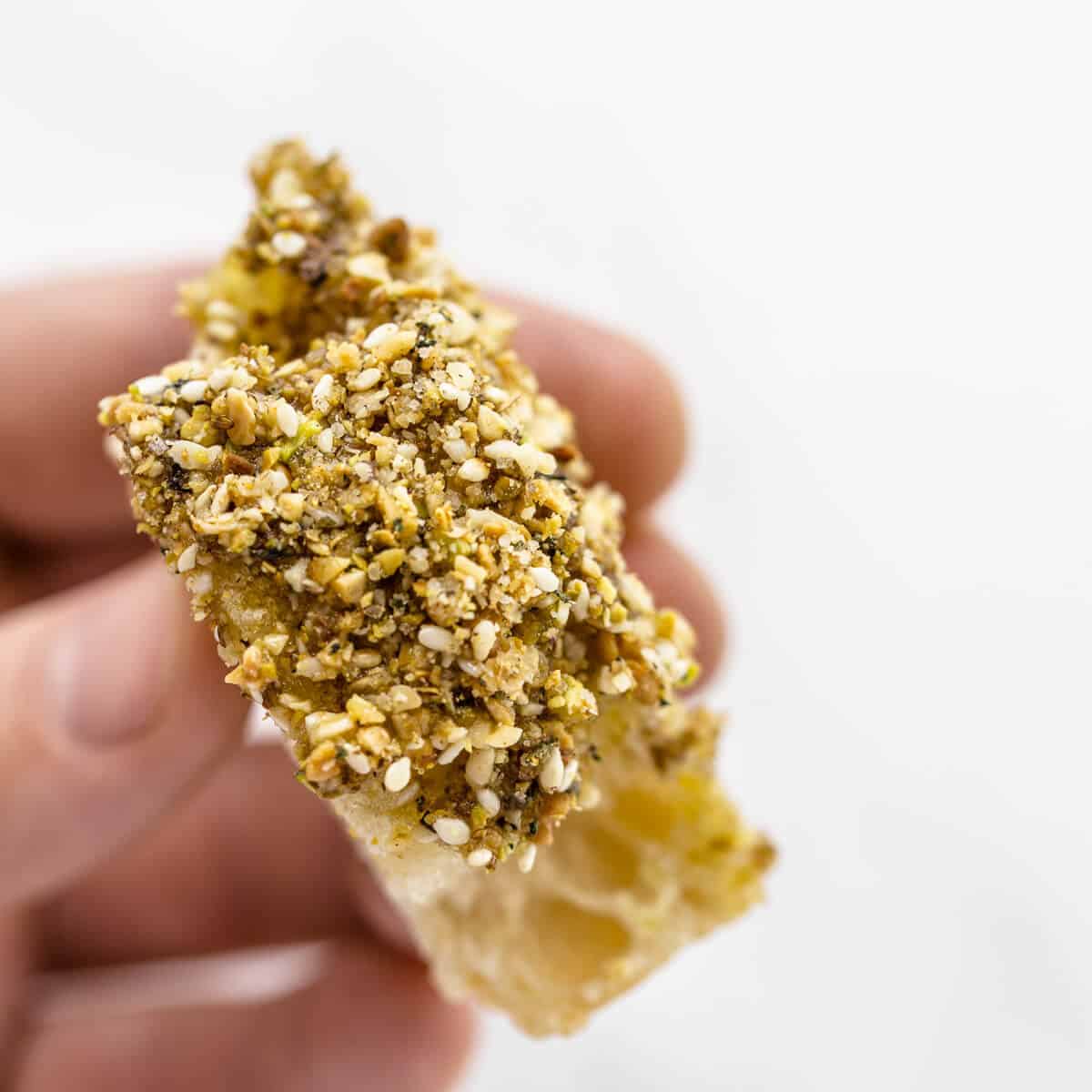
Useful equipment for this recipe
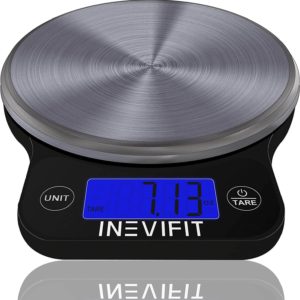
Electronic Kitchen Scales
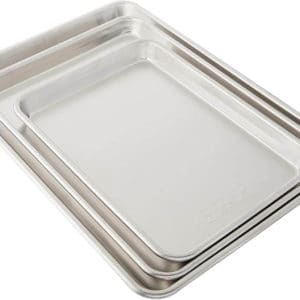
Baking Sheets
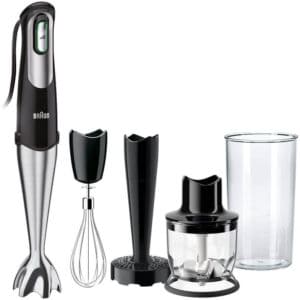
Immersion Blender
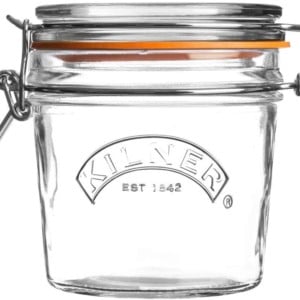
Small Kilner jars
This site contains affiliate links. I may earn a tiny commission on qualifying purchases at no extra cost to you. By bookmarking these links you help support the upkeep of this site.
If you found this post helpful or have learned something, comment, subscribe, and follow me on social platforms for more tasty recipes.
Recipe
Easy Authentic Egyptian Dukkah
Ingredients
- 130 g (1 cups) pistachios - shelled
- 130 g (1 cups) hazelnuts - shelled
- 70 g (½ cups) flaked almonds
- 70 g (½ cups) pine nuts
- 50 g (⅓ cups) sesame seeds
- 5 g (1 tablespoon) coriander seeds
- 2 g (1 teaspoon) whole cumin
- 1 g (¼ teaspoon) black peppercorns
- 35 g (2 tablespoon) fine sea salt
- ¼ bunch (¼ bunch) fresh thyme - only need the leaves
- 30 g (2 ½ tablespoon) sugar
Instructions
For the nuts and seeds
- Turn your oven to 160C or 320F.
- Spread the nuts out separately. Each onto their own baking tray or repeat if you only have one baking tray.
- For no particular reason, we shall start with the pistachios. They should already be shelled but still in their husk. Roast for about 8 - 10 minutes then remove from the oven and let cool down completely. Keep an eye on them as they roast as to not burn them. Your oven is not my oven and cooking times might differ. Common sense goes a long way. Rub them between your hands when cooled to remove most of the skin. Most people don't like the bitterness from the skins/husks so, we remove it.
- Hazelnuts next. Repeat as for the pistachios. Same time. Same process. Same attention.
- Flaked almonds will take slightly less time to roast. About 6 minutes should do it.
- Pine nuts are in the same boat as almonds. They burn in the blink of an eye so pay even closer attention. 6 - 8 minutes.
- I prefer preparing sesame seeds in a pan on the stove. Simply toast in a pan while tossing constantly over medium heat until nicely fragrant or golden brown. Once done, remove from the pan to stop them from cooking and let cool down completely.
For the spices
- Heat a skillet on the stove on medium heat without oil. Just dry.
- When the skillet is hot add the whole spices. Cumin, coriander, and black peppercorns.
- Toss continuously to avoid disappointment and end up with perfectly home-roasted spices.
- Add into a spice grinder or pestle and mortar. Let it cool down first before grinding into a fine powder.
Bringing it all together
- If you have a food processor then pulse the nuts as to break them up into small bits. If you don't have a food processor then grab a knife, large chopping board and get chopping. Crush the nuts with the side of the knife first before running the blade through it a few times until small and evenly chopped. Do not over-process the nuts. They will release their oils and you will end up with nut butter instead, so be mindful. Keeping the nuts cool helps to avoid this which is why we cool them down before processing.
- When the nuts are blended or chopped, add them into a mixing bowl.
- Add the sesame seeds, spice mix, thyme leaves, salt, and sugar.
- Mix it up well making sure everything is evenly distributed. Now, you have proper Egyptian dukkah.
Notes
- You can make a large batch and store in airtight containers for many months.
- If you want to make a Keto version or no-sugar dukkah then replace the sugar with an alternative or omit all-together.
- Dukkah makes a great gift so put it in a jar, wrap it up nicely and take it with to the next party.

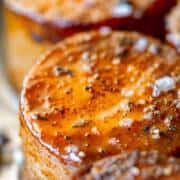
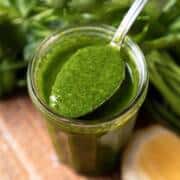

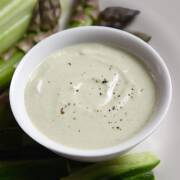
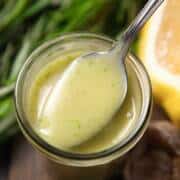
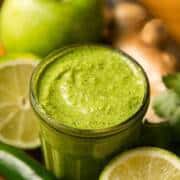
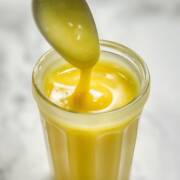

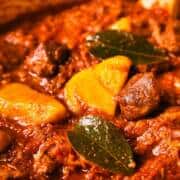
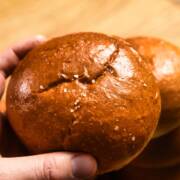

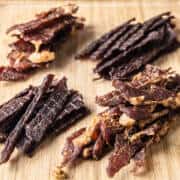
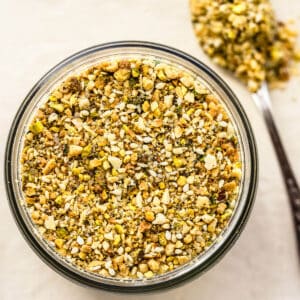
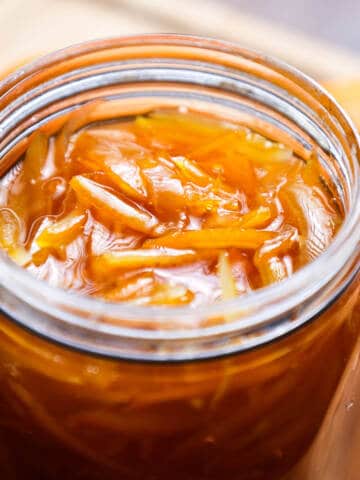
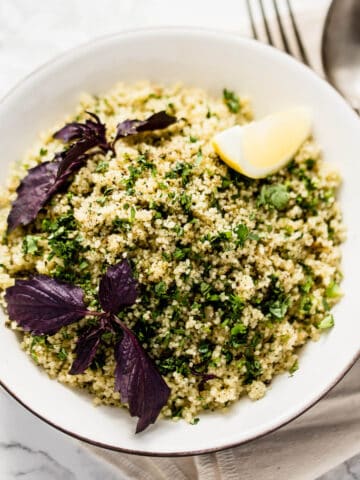
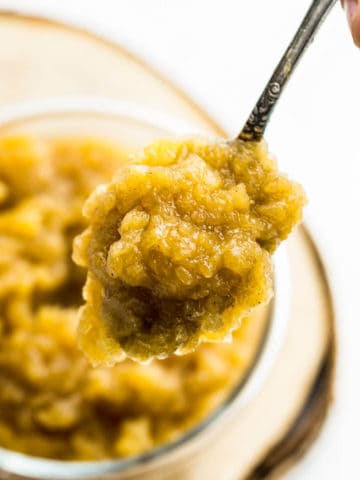
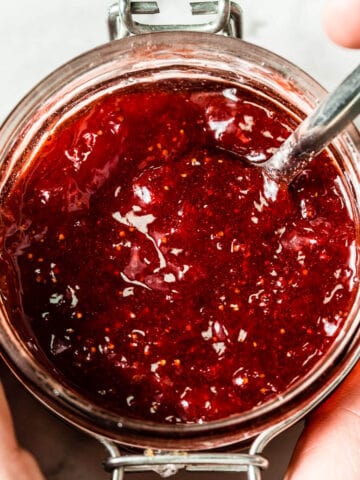
Comments
No Comments